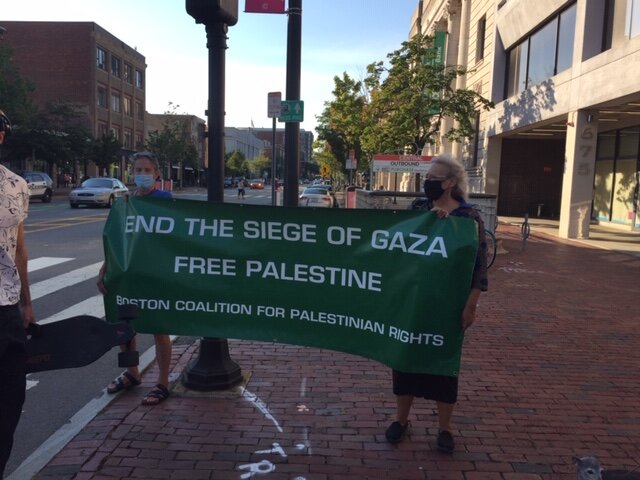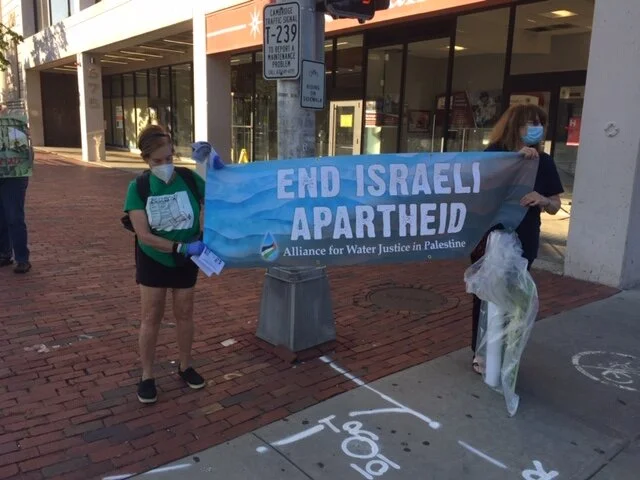Bi-Weekly Brief for September 21, 2020
Attempts to control the spread of Covid-19 grow increasingly desperate
On Sept. 18, Israel became the first country to re-impose a 3-week lockdown because of soaring rates of Covid-19 that have now reached 188,760 cases, with 1,260 deaths. Israelis face steep fines if they do not remain within 1 kilometer of their homes. Times of Israel (Sept. 21) reported hospitals in Jerusalem and Ashdod turning away Covid-19 patients. The latest available figures for the West Bank and East Jerusalem are 42,450 cases and at least 250 deaths. The Gaza Strip – where the virus is rapidly spreading – accounts for 2,400 cases and 17 deaths. Gaza has had 4 weeks of curfew and total lockdown of some areas since Aug. 24 when ‘community spread’ was detected.
White House ‘peace treaty’ extravaganza: no war to end but many weapons to sell
On Sept. 15, Trump staged a largely mask-free White House signing ceremony before hundreds of people of a ‘peace treaty’ between Israel and the UAE (which were never at war), and a ‘peace declaration’ between the 2 countries with the highest virus infection rate by population in the world (Bahrain ranks #1, followed by Israel). According to Haaretz(Sept. 15), at the last moment Netanyahu agreed to add a clause requiring ratification by the Israeli government in return for the power of attorney he needed to sign the ‘Abraham Accords,’ whose terms have not been disclosed. The US is reportedly planning to sell the UAE F-35s ($80 million each) and Bahrain F-16s ($50 million each), and offering inducements to other countries to embrace Israel as a new Middle East alliance takes shape. Times of Israel (Sept. 16) quoted Trump as saying “7 or 8 or 9” countries would soon normalize and Saudi Arabia will “come at the right time.”
No end to repression, creeping annexation and heartbreak
To protest the UAE/Bahrain betrayal, demonstrations were held in several West Bank cities on Sept. 15, and two rockets were fired from Gaza into Israel. Israel responded with 10 missile strikes. The Israeli Defense Force (IDF) conducted over 100 raids on the West Bank to make arrests and repress protests, 2 incursions into the Gaza Strip, and on Sept. 16, fired twice on Gaza’s fishing boats. On Sept. 18, Dr. Nidal Jabarin died of a heart attack when nearly hit by a stun grenade while going to his Jenin dental clinic. House demolition orders were issued in many parts of the West Bank and in Silwan (East Jerusalem) a resident was forced to self-demolish his house in order to avoid paying demolition costs of $30,000 or more to the municipality. On Sept. 20, at least 76 settlers stormed into the Al-Aqsa compound in Jerusalem to celebrate Rosh Hashanah.
Water Fact
According to a report issued by the Al-Mezan Centre for Human Rights, Gaza’s residents confined to their homes to stop the spread of Covid-19 are struggling to obtain water for drinking, cleaning and personal hygiene. Power cuts often bar them from filling rooftop tanks when water is available from the municipality. In the Jabalya refugee camp, after one person tested positive for the virus, 24 family members were told to ‘self-isolate,’ and prevented by police from leaving their home in search of water.
See the Palestine Chronicle and the Palestinian Center for Human Rights
Banner design by Paul Normandia/Red Sun Press






